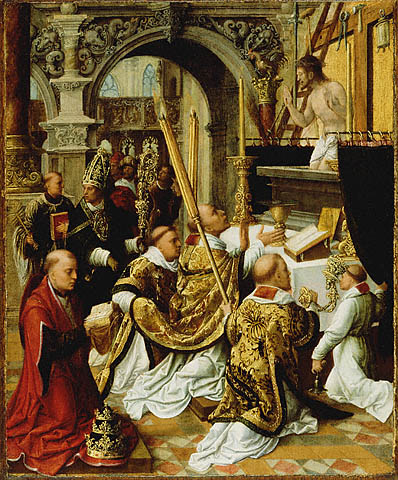 The High Altar of the Cathedral of Köln. The golden Reliquary is the Shrine of the Three Kings (Dreikönigenschrein), begun by the goldsmith Nicholas of Verdun in 1180 or 1181 and completed after his death circa 1225. The reliquary is believed to contain the bones of the Three Magi.
The High Altar of the Cathedral of Köln. The golden Reliquary is the Shrine of the Three Kings (Dreikönigenschrein), begun by the goldsmith Nicholas of Verdun in 1180 or 1181 and completed after his death circa 1225. The reliquary is believed to contain the bones of the Three Magi.Sequitur Offertorium. Deinde Praeparatio accessoria ad Canonem: Lavabo inter innocentes manus meas: et circumdabo altare tuum, Domine.
Deinde fac Signum Crucis super Calicem: In nomine Patris + et Filii et Spiritus Sancti. Quid retribuam Domino pro omnibus quae retribuit mihi. Calicem salutaris accipiam et nomen Domini invocabo.
Tenens Calicem in medio Altaris dic: In spiritu humilitatis, et in animo contrito suscipiamur, Domine, a te: sic fiat sacrificium hodie et placeat tibi, Domine Deus.
Accipe Patenam: Acceptabile fiat omnipotenti Deo sacrificium istud in odorem suavitatis.
Benedic utriumque: Veni, invisibilis Sanctificator, omnipotens aeterne Deus: benedic + et sanctifica hoc sacrificum nomini tuo praeparatum. Per Christum Dominum nostrum.
Inclina et dic: Suscipe sancta Trinitas, hanc oblationem, quam tibi offerimus in memoriam passionis, resurrectionis, ascensionis Domini nostri Jesu Christi: et in honorem sanctissimae Dei Genitricis Virginis Mariae: et Sanctorum quorum hodie festivitas celebratur: et quorum hic nomina et reliquiae habentur: nec non et Sanctorum tuorum qui tibi placuerunt ab initio mundi. Ut proficiat ad honorem: nobis autem et omnibus fidelibus vivis et defunctis ad salutem et ad remissionem omnium peccatorum: et ut omnes pro nobis dignentur interdecere in coelis, quorum memoriam agimus in terris. Per eundem Christum Dominum nostrum. Amen.
Verte te ad populum: Orate pro me peccatore, fratres et sorores: ut meum pariter et vostrum sacrificium acceptum sit omnipotenti Deo.
<Domini, exaudi orationem meam.> Et clamor meus ad te veniat.
Oremus. Deinde legatur Secreta, cujus finis est initium Praefationis.
<Per omnia saecula saeculorum.> Amen.
<Dominus vobiscum.> Et cum spiritu tuo.
<Sursum corda.> Habemus ad Dominum.
<Gratias agamus Domino Deo nostro.> Dignum et justum est.
Vere dignum et justum est, aequum et salutare etc. etc.
Sanctus, Sanctus, Sanctus, Dominus Deus Sabaoth. Pleni sunt coeli et terra gloria tua. Hosanna in excelsis. Benedictus qui venit in nomine Domini. Hosanna in excelsis.
=====================
The Offertory shall then follow. Then the assessory preparation up to the Canon: I wash my hands among the innocent, and go around Your altar, O Lord.
Then he shall make the Sign of the Cross over the Chalice: In the name of the Father, + and of the Son and of the Holy Spirit. What return shall I make to the Lord for all He has given me? I will take the Chalice of salvation and call upon the Name of the Lord.
He shall hold the Chalice at the middle of the Altar, saying: In a humble spirit and with a contrite heart, may we be accepted by You, O Lord; may our sacrifice be so offered this day and please You, O Lord God.
He shall then take the Paten: May this Sacrifice be acceptable to the Almighty God, in the odor of sweetness.
He shall then bless both: Come, O invisible Sanctifier, Almighty and Eternal God; bless + and sanctify this sacrifice prepared for the glory of Your Name, through Christ our Lord.
He shall bow and say: Receive, O Holy Trinity, this oblation which we offer to You in memory of the Passion, Resurrection and Ascension of our Lord Jesus Christ: and in honor of the most-Holy Mother of God, the Virgin Mary; and those Saints whose feast we now celebrate, whose names and relics we have, and also Your Saints who make this request of You from the beginning of the world. To them let it bring honor, and to us salvation, and all the faithful living and dead, and the remission of all sins; and may they intercede for us in Heaven, whose memory we honor here on Earth. Through the same Christ our Lord. Amen.
He shall face the people: Brothers and sisters, pray for me, a sinner; that my Sacrifice and equally yours may be accepted by the Almighty God.
Let us pray He shall then recite the Secret; and at its end begin the Preface
<Forever and ever.> Amen.
<The Lord be with you.> And with your spirit.
<Lift up your hearts.> We have lifted them up to the Lord.
<Let us give thanks to the Lord our God.> It is meet and just.
It is truly meet and just, right and profitable etc. etc.
Holy, Holy, Holy, Lord God of Hosts. Heaven and Earth are filled with your glory; Hosanna in the highest. Blessed is He Who comes in the Name of the Lord. Hosanna in the highest.








